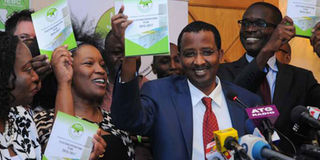The campaign season is here, but are we staring at a 2007 moment again?

Independent Electoral and Boundaries Commission Chairman Issack Hassan (center) launches the Election Operation Plan 2015-2017 at Intercontinental hotel in Nairobi on January 14, 2016. The IEBC has not risen into the political arbiter we expect. PHOTO | JAMES EKWAM | NATION MEDIA GROUP
What you need to know:
- The political temperatures will go a notch higher than ever before and the nation will be polarised for slightly longer than is necessary.
- At the very least, let us agree that the media has a higher obligation in the campaign season.
- Politicians would like to create a narrative and get it to acquire a life of its own. Opinion shapers can’t do the same.
We already have hit the campaign season even though elections are more than a year and a half away.
The political temperatures will go a notch higher than ever before and the nation will be polarised for slightly longer than is necessary.
I can remember a time when it happened in a similar way.
The 2007 election campaigns started in 2005 after the ‘NO’ campaign morphed into ODM.
The then government ratcheted matters by firing those in Cabinet who opposed that draft constitution and helped consolidate an opposition that was vigorously desirous of an electoral victory.
The campaigns turned into a duel in which the electoral outcome was poised to be a do-or-die thing.
Given the zero-sum nature of our politics, government swung in with threats.
The police were mobilised to threaten people into silence and rig the outcome in favour of the incumbent.
But all these were inadequate. They only enhanced the commitment within the opposition to fight for what they perceived as their democratic rights.
When the political battle was finally joined, even commentators became combatants, be they columnists in newspapers, reporters on the campaign trail or foreign observers whose partiality could not be hidden.
Commentators on both sides made their predictions and opinion polls ratcheted up the stakes.
SIMILAR OCCURRENCE
Even the media joined the fray with headlines that manipulated language, went for the dramatic and mobilised the outlandish.
My young friend, Sammy Gakero Gachigua, has documented.
Reflecting on the 2013 elections, Denis Galava wrote in New Constitutions, Same Old Challenges edited by Fred Otieno that the media moved from watchdogs to hostages of peace; that in essence they killed the news to keep the peace.
We are headed into the 2017 general elections and the script is repeating itself with unnerving similarities.
There is the politicisation of corruption and an attempt to sanitise political actors whose record is abhorrent at best.
The IEBC has not risen into the political arbiter we expect.
In fact, in some cases, it has played repeatedly into the hands of political actors with startling naivety.
It is one thing for IEBC to launch a strategic plan and draft plans on handling elections.
But IEBC must remember that all the political actors have their unwritten political plans. Their aim is to bias the electoral outcome in their own favour.
But by far more disturbing are analyses by political commentators especially in the media.
There are the outlandish ones that deserve but limited attention.
Others are outrightly partisan, bereft of any pretence to critical analysis or verifiable evidence.
As a self-declared supporter of Raila Odinga, I police myself incessantly on what I write and care about its credibility in the eyes of impartial analysis.
This is why I found Nic Cheeseman’s recent conclusion that the opposition is at its weakest since 2002 extremely bewildering.
HIGHER RESPONSIBILITY
He based his conclusion on static snapshots derived from recent polls.
He also seemed a little too impressed with the recent Jubilee Coalition strategy of raiding the opposition strongholds.
In fact, the Jubilee antics are well-rehearsed strategies that don’t impress.
Incidentally, I was in Kakamega after the so-called Luhya leaders came back from their pilgrimage in Eldoret.
I saw some walking sheepishly in town, not wanting to self-identify as returnees from Eldoret.
This reminded me that campaigns are about make-believe.
Opinion polls flow and ebb depending on the moment and have limited bearing on electoral outcome more than a year before balloting.
At the very least, let us agree that the media has a higher obligation in the campaign season.
So, too, are columnists. Our work is too important to allow for any pandering on impressions manufactured by political actors.
Politicians would like to create a narrative and get it to acquire a life of its own. Opinion shapers can’t do the same.
Godwin R. Murunga is a senior research fellow in the Institute for Development Studies, University of Nairobi





